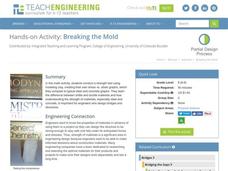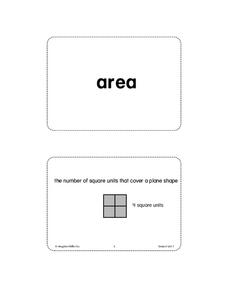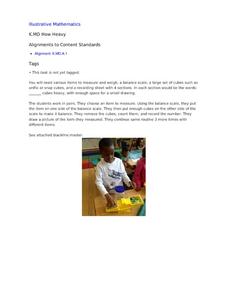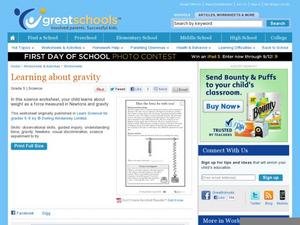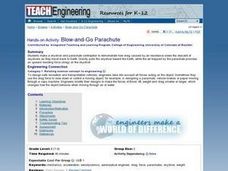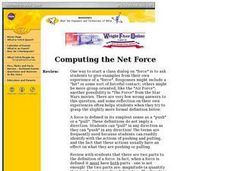Teach Engineering
Breaking the Mold
A little too much strain could cause a lot of stress. Groups conduct a strength test on clay. Using books as weights, pupils measure the compression of clay columns and calculate the associated strain and stress. Teams record their data...
Agriculture in the Classroom
Pumpkins... Not Just For Halloween
Celebrate fall with four pumpkin themed hands-on activities! After learning about pumpkins, scholars complete two activity sheets that reinforce estimation and word problems. They then plant pumpkin seeds and bake a pie in a bag.
Exploratorium
Tired Weight
You don't need a scale to determine weight. This activity provides a way to use the concepts of air pressure and surface area to determine the weight of a vehicle by calculating the amount of weight each tire supports.
Houghton Mifflin Harcourt
Unit 7 Math Vocabulary Cards (Grade 2)
Reinforce math vocabulary instruction with a set of flash cards. Fifty-six cards offer either a bold-face word or a picture representation equipped with descriptive labels. Terms include centimeters, gallons, square units, and more!
Houghton Mifflin Harcourt
Unit 7 Math Vocabulary Cards (Grade 1)
Give math vocabulary instruction a boost with a set of flash cards covering terms such as centimeter, pound, and thermometer to name a few. Word cards are typed using a bold-style font, and correspond to picture cards that include...
Curated OER
Mass vs. Weight
Why do you weigh more in space? Each individual in your class explores this question and others as they determine the mass and weight of different objects using two types of scales. They perform conversions and discuss their results,...
It's About Time
Push or Pull - Adding Vectors
Demonstrate Newton's Second Law of Motion with an engaging lesson. Individuals explore the difference between forces in relation to a push or a pull, and they identify various forces that cause an object to move. They explore the concept...
Center for Learning in Action
Properties of Balls
Enhance your states of matter lessons with a hands-on science investigation that compares six different balls' color, texture, size, weight, ability to bounce, and buoyancy.
Curated OER
The Metric System
Applying this metric worksheet, mathematicians will provide standard metric units of measurement, identify the largest and best way to measure items using the metric system, and convert units using King Henry.
Illustrative Mathematics
Longer and Heavier? Shorter and Heavier?
For many young children it seems obvious that longer objects are heavier than shorter objects. This assumption is put to the test as the class investigates the relationship between length and weight in a whole-group activity. Using a...
Curated OER
How Heavy
Break out the balances for this primary grade lesson on weight measurement. Using common elementary school manipulatives like unifix or snap cubes, young mathematicians determine the weight of four different classroom objects. A graphic...
Illustrative Mathematics
Which Weighs More? Which Weighs Less?
Expand the the comparative language of young mathematicians with a hand-on weight measurement activity. Working independently or in pairs, children compare the weight of large wooden blocks to various other classroom objects, recording...
Baylor College
Global Atmospheric Change: The Math Link
Change up the classroom atmosphere with this interdisciplinary resource. Following along with the children's book Mr. Slaptail's Curious Contraption, these math worksheets provide practice with a wide range of topics including simple...
Lewiston High School
Weight and Mass & Forces in Equilibrium
I would weigh less on the moon? Send me there, then! On the top of the first page, a cartoon image demonstrates the difference between Earth and the moon. It then goes on to describe weight and mass and provides five practice problems...
Baylor College
Body Mass Index (BMI)
How do you calculate your Body Mass Index, and why is this information a valuable indicator of health? Class members discover not only what BMI is and practice calculating it using the height and weight of six fictitious individuals, but...
Curated OER
Learning about gravity
Learn how to measure weight with newtons in a science experiment about gravity. After they read a short paragraph about force, fifth graders draw an arrow to indicate which way a spring is being pulled. Next, they survey their family...
Curated OER
Blow-and-Go Parachute
Students design a skydiver and parachute constraption to demonstrate how drag caused by air resistance slows the descent of skydivers as they travel back to Earth. They experience how gravity pulls the skydiver toward the earth and how...
Curated OER
Unit V: Worksheet 2 - Constant Force
Physics learners studying force and acceleration practice solving eight problems with this assignment. They calculate acceleration and deceleration, net force, and distances required for stopping a moving object. Kinematics equations and...
Curated OER
What Unit of Measurement?
If you're measuring a bicycle, would you use inches, feet, or yards? What about when you measure a shoe, or a flagpole? Explore measurement with this worksheet, which prompts third graders to use their critical-thinking skills. Three...
Curated OER
Computing the Net Force
Adorable little stick figures push and pull a cart of blocks to explain the push and pull of forces. Future physicists then define force and identify it in different situations on the worksheet that follows. Concepts covered include...
Curated OER
Graphing the Four Forces
Using the Cartesian coordinate system, future flight experts plot points to determine whether or not an airplane will fly. With the four forces of weight, lift, drag, and thrust represented in different quadrants, your physics learners...
Curated OER
Mass Lesson
It's not just a slideshow, it's a lesson on mass. First, learners complete a mental math warm-up, where they determine the number before and after a series of given numbers, then they form groups to weigh packages and compare mass....
Curated OER
Mass Problems
Here are 22 problems on 4 pages intended to provide practice in calculating mass. Learners determine the differences in weight, fractional equivalents of given quantities, and determine which item is heaviest or lightest. The problems...


